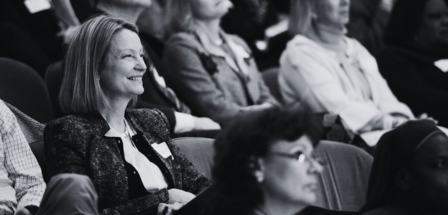The Heart of the Meeting: Reflections from Elizabeth Lynn
The Heart of the Meeting: Reflections from Elizabeth Lynn
By Elizabeth Lynn
People who enjoy meetings should not be in charge of anything. –Thomas Sowell
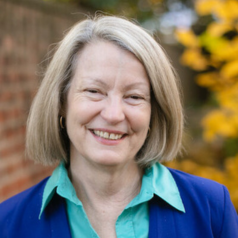 Since I am retiring from my work with Lake Institute at the end of this month, I think it is safe to make a confession: I have been known to enjoy meetings.
Since I am retiring from my work with Lake Institute at the end of this month, I think it is safe to make a confession: I have been known to enjoy meetings.
This spring, two meetings took place that made my heart sing.
One was the 2025 Symposium on Philanthropy and the Black Church, co-hosted by Lake Institute and Garrett-Evangelical Theological Seminary. The other was a special convening on Faith, Philanthropy, and Third Spaces, hosted by the Appalachia Funders Network with support from Lake Institute and others.
Each of these meetings helped a diverse group of faith and philanthropic leaders build relationships on the ground of common values and commitments. Each helped participants imagine new ways they could serve the communities they love. And each grew out of work I have been honored to help start at Lake Institute, focused on fostering reflective conversation about the changing nature of faith, giving, and community engagement.
For me, these events mark a culmination, a closing chapter for my work with Lake Institute—but for participants, they were hopefully just the beginning of new partnerships and possibilities on the shifting ground of faith and giving.
An Invitation I Could Not Refuse
My relationship with Lake Institute goes back many years to 2004, when I received an unexpected invitation from inaugural director Dr. William Enright to join Lake’s advisory board. At the time I was leading the Project on Civic Reflection, a national initiative to encourage reflective conversation on the deeper values that animate giving and serving in American life. As Bill Enright explained to me, Lake’s own founding vision included a strong commitment to reflective conversation about faith and giving, alongside research and education. Bill hoped that I could help Lake better understand and realize the possibilities of reflective conversation.
I served on the advisory board for 14 years, advocating for reflective conversation as an essential part of Lake’s DNA, whether in its programming, evaluation, strategic thinking … or even its board meetings. Along the way, I learned a great deal from Bill about leadership; from my fellow board members about the rich interplay between faith and giving across religious traditions; and from our first board chair, the remarkable Don Johnson, about board structure and service. In time I became vice chair, then chair. Midpoint in those 14 years, Bill retired, and we welcomed Lake’s second director, Dr. David King, who brought new research skills and expansive questions to the work, helping Lake grow its team and its reach.
And then in 2018, at David’s invitation, I stepped off the board and onto the growing team to serve Lake Institute in a new way.
Shifting Ground
In 2018, it had become clear that changes in faith and giving were underway—and that these changes were impacting not only congregations but larger communities. The shifting ground of faith and giving posed a challenge that captured my interest and drew me even deeper into the work of Lake Institute: How could we help religious and philanthropic leaders navigate this ground with fresh imagination and faithfulness? And how could we even encourage them to work together?
Multiple studies were showing declines in organized religion, as measured in affiliation and attendance, even as increasing numbers of Americans considered themselves “spiritual even if not religious.” Notably, at the same time, patterns of giving were changing. By 2018, less than half of American households were participating in charitable giving, even as the overall “pie” of charitable giving continued to grow. The result, for many congregations and other faith-based groups, was a pressure-cooker phenomenon, with fewer givers giving more to sustain their organizations, and no easy way out.
Amidst these changes, religious leaders had started asking fundamental questions about their mission and ministry:
- What should be sustained—and how can it be sustained, if not through the traditional model of tithes and offerings?
- Are there faithful possibilities for the use of properties that no longer align with our hopes and purposes?
- Who are we to the world beyond our walls and doors, such that others would care what happens to us?
- Are there community partners we could engage? Funding partners we haven’t yet met?
At the same time, philanthropic leaders were asking new questions about faith communities. The declines in broad-based giving affecting congregations were also impacting the nonprofit sector, igniting concerns about the future of generosity as a habit of the American heart. Civil society seemed to be fraying from the center out. As they grappled with these changes, many philanthropic leaders started taking a new look at religious organizations, asking how they could better partner with congregations and other faith-based organizations to build bonds and trust and address common societal concerns.
Uniquely located at the intersection of faith and giving, Lake Institute wanted to help both sets of leaders better understand these intersecting changes. With generous support from Lilly Endowment Inc., we launched an initiative, Shifting Ground, to develop and pilot resources, engage religious and philanthropic leaders in conversation, and create a new website and resource library to make our offerings more accessible to all.
What Worked … and Didn’t
One of the greatest gifts a foundation grant can give an organization is room to fail. Shifting Ground gave us that room at Lake Institute. It became a workshop of sorts, off to the side of more regular operations, to test out different conversational resources and learn from what worked and what didn’t.
An early case in point was the 4D Framework, which we developed to help religious leaders discern and discuss four distinct dimensions of economic challenge for their congregations. The leaders we shared it with found the framework illuminating but hard to take home and use. However, they did take home the vignettes we shared to illustrate the Four Dimensions.
Out of this insight grew a new idea: an online ‘story collection,’ stocked with vignettes of congregations and other religious organizations using their assets in new and creative ways to live out their faith and values on shifting ground. Today, the Faithful Generosity Story Shelf holds nearly 70 such stories along with learning tools and discussion guides. Most importantly, these stories are short enough to read on the spot, in a committee meeting, say, or a congregational retreat—all those places we already meet to steward the organizations we love.
This design feature illustrates one of my favorite learnings: Reflective conversation can be part of a meeting; it doesn’t necessarily have to be a meeting apart. Whether we serve in religious or nonprofit or philanthropic organizations, we all meet a lot. We could do so much more to make those meetings meaningful, by building in time for reflection on our hopes and purposes, especially in the midst of such tectonic societal changes. The Story Shelf and other resources developed through Shifting Ground are meant to be used as prompts for this kind of reflection—to anchor deeper conversation in the midst of shared leadership.
Sometimes, though, and especially in times of change, we also need to create meetings apart, in order to build new relationships across sectors and silos. The two meetings this spring that made my heart sing, on Philanthropy and the Black Church, and on Faith, Philanthropy and Third Spaces, did this other kind of work. They brought together leaders who are seldom in the same room together yet share deep values and commitments—and leaders who need each other in new ways as faith and giving shift and change.
Conversations that Matter
There is no simple answer to the challenges being faced across sectors. There is, however, a singular and pressing need for deeper reflection and conversation, within and across sectors, about what matters—something the founders of Lake Institute understood from the start and the leaders of Lake Institute are pursuing with creativity and capacity today. I leave this work profoundly grateful to David and all the members of the Lake team for their commitment to the institutions of our common life, their spirit of learning, and their willingness to walk with me through this chapter of work, one experiment and meeting at a time.
Expanded Perspective: How Research Impacts Religious Work
By David P. King, PhD, Karen Lake Buttrey Director
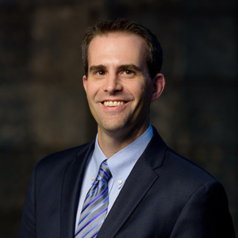 It is certainly true that we are facing shifting ground across the larger landscape of faith and giving, but at Lake Institute, we are experiencing our own shifting ground as we face the fact that Elizabeth Lynn will be retiring from her work with us this June. Throughout the more than a decade now that I have helped to lead Lake Institute, I have relied on Elizabeth as a wise partner across so many roles as a board member, board chair, and staff member.
It is certainly true that we are facing shifting ground across the larger landscape of faith and giving, but at Lake Institute, we are experiencing our own shifting ground as we face the fact that Elizabeth Lynn will be retiring from her work with us this June. Throughout the more than a decade now that I have helped to lead Lake Institute, I have relied on Elizabeth as a wise partner across so many roles as a board member, board chair, and staff member.
Elizabeth’s perspective is clear, and it has meant so much to Lake. In the same way that she invites us in her article to focus on the reflective conversation that leads us to the deeper values animating giving and serving in American life, she has helped to embed those questions specifically in our shared work at Lake Institute. Staff meetings are better when we center around a question that Elizabeth has helped to frame. Our work is better as we explore the current and future edges at the intersection of faith and giving. And our ability to partner is better as Elizabeth seeks out a diverse array of institutional and individual voices to engage. I imagine that many of our Insights readers were introduced to Lake Institute through a conversation, convening, or resource that Elizabeth helped to shape.
Consistently, Elizabeth has rooted her work at Lake Institute in our core mission that seeks to explore the dynamic relationship between the ways in which faith inspires and informs giving. And truly she has captured the dynamism in these interactions with some key foundational values. First, these interactions are rooted in traditions. One of Elizabeth’s earliest and most lasting contributions to this work is her categorization of the four (or five) traditions of philanthropy that continues to capture the imagination and questions of practitioners. Second, she has prioritized the need for civic reflection – a skill and practice that is in short supply and a significant need in our society today. Third, she has intentionally looked to do this kind of reflection across faith traditions and sectors. What can a Christian pastor learn from a Jewish nonprofit leader, and what can both learn from a program officer in a regional community foundation or state humanities council? Finally, she has always offered these reflections on the work they would do in practice. These big questions are not ones to merely contemplate; instead, they are the ones we must ask to shape and reshape the work itself.
I perceive that a part of Elizabeth’s vocation has been invitational by nature. She has consistently invited us to explore both big and vital questions in the work that each of us has individually been given to do. The questions rarely have easy answers, but that is what makes them exciting to explore. And through the conversations shaped with care and the partnerships developed with patience, she has modeled the ways in which we can address these most pressing and expansive questions of faith and giving – even as we sit on shifting ground.
I am most grateful for not only who Elizabeth is but for the ways in which she has done her work that leave us with much work left to do. I know many of you are equally inspired to take up the task of continuing to engage these questions together, slowly and surely, as they most centrally shape our life together.
ECRF Summer Scholarship Applications: Now Open
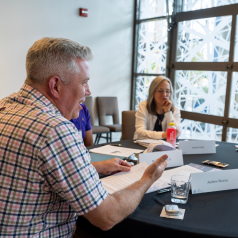 The 2025 summer scholarship process for the Executive Certificate in Religious Fundraising (ECRF) is now open. ECRF is an eight-week online religious fundraising course with a practical application project. The application will close on August 1, and you can expect to receive a response by August 18, 2025.
The 2025 summer scholarship process for the Executive Certificate in Religious Fundraising (ECRF) is now open. ECRF is an eight-week online religious fundraising course with a practical application project. The application will close on August 1, and you can expect to receive a response by August 18, 2025.
Dr. William Enright’s Reflection on Lake Institute’s Mission
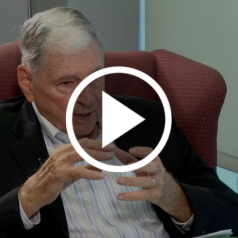 In this video, Dr. William Enright, Founding Director of Lake Institute on Faith & Giving, reflects on the evolution of Lake Institute’s mission. Bill also shares his insights on how taking “family” out of Lake Institute’s name expanded its reach and awareness in the local community.
In this video, Dr. William Enright, Founding Director of Lake Institute on Faith & Giving, reflects on the evolution of Lake Institute’s mission. Bill also shares his insights on how taking “family” out of Lake Institute’s name expanded its reach and awareness in the local community.
Subscribe
Insights is a bi-weekly e-newsletter for the religious community and fundraisers of faith-based organizations that provides:
- Reflections on important developments in the field of faith and giving
- Recommended books, studies and articles
- Upcoming Lake Institute events

